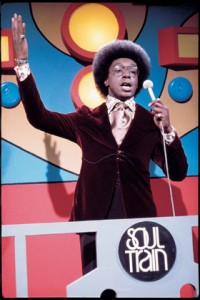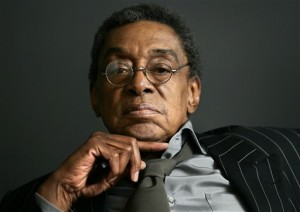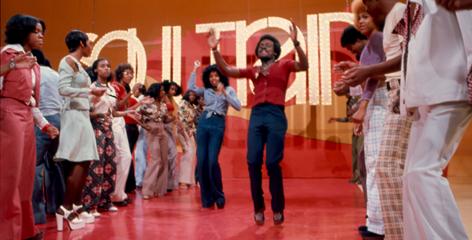And you can bet your money, it’s all gonna be a stone gas, honey!
 The above are the signature sign-off words Don Cornelius intoned in silky baritone to entice viewers to tune in to the next episode of Soul Train, the iconic music and dance show that aired from October 1971 to March 2006, making it:
The above are the signature sign-off words Don Cornelius intoned in silky baritone to entice viewers to tune in to the next episode of Soul Train, the iconic music and dance show that aired from October 1971 to March 2006, making it:
…the longest-running, first-run, nationally syndicated program in television history.
(Los Angeles Times, February 1, 2012)
As the name suggests, Soul Train provided Black entertainers a unique stage (in a still mostly segregated America) on which to strut their stuff. And the music they performed ran the gamut from R&B to gospel – as everyone from The Jackson 5 to Funkadelic will attest. Ironically, reports are that Cornelius hated hip hop and only featured rap artists to keep the show looking, well, hip.
But almost as entertaining were the show’s dancers who invariably inspired viewers (including islanders like me down in the Caribbean) to get off the couch and dance, dance, dance. In fact, Soul Train pioneered the line dance, which featured couples voguing long before Madonna was even a figment in the public’s imagination.
Apropos of voguing, viewers were eager to copy not only the dancers’ latest moves, but everything from their clothes to their shoes. The dancers were such trendsetters in this respect that the show is generally referred to these days as a veritable time capsule for over three decades of Black-American culture.
Of course, the concept for the show was pioneered by Dick Clark’s lily-white American Bandstand. But only a few token blacks were ever featured on that show. Indeed, you might think of Soul Train as being to American Bandstand what BET (in its early days) was to MTV.
It is noteworthy, though, that Clark was so jealous of and/or threatened by Soul Train’s crossover appeal that he launched Soul Unlimited as a separate-but-qual version of American Bandstand to compete: it did not, forcing Clark to cancel it after only a few embarrassing episodes.
As it happened, Soul Train provided White America a window into Black America. I actually know a few Whites who claim they began watching it long before I did. Even more interesting is the fact that Whites were featured on the show busting moves long before Studio 54 made integrated dance floors more the fashion than the exception.
As for the man himself, I suppose the only way to get anyone under 30 to appreciate what a cultural icon Cornelius was is to tell them that he was in his day what Ryan Seacrest and Simon Cowell (combined) are today.
No doubt the reason for his faded celebrity was the explosion of media outlets in the 1990s that diffused the niche Soul Train once enjoyed. Not surprisingly, just as Bob Johnson was compelled to sell BET in 2000 to the bigger and more multi-faceted entertainment company Viacom, Cornelius was compelled to sell Soul Train in 2008 to Madvision Entertainment.
 Alas, it became clear when he was arrested that same year for domestic violence that his private life was not nearly as charmed as his public life. But he may have telegraphed why he finally killed himself when he reportedly pleaded during divorce proceedings in 2009 that:
Alas, it became clear when he was arrested that same year for domestic violence that his private life was not nearly as charmed as his public life. But he may have telegraphed why he finally killed himself when he reportedly pleaded during divorce proceedings in 2009 that:
I am 72 years old. I have significant health issues. I want to finalize this divorce before I die.
(TMZ, February 1, 2012)
Cornelius died at his home in California early yesterday from a self-inflicted gunshot to the head. He was 75.
Farewell, Don (“…and as always in parting, we wish you love, peace … and soul”).
